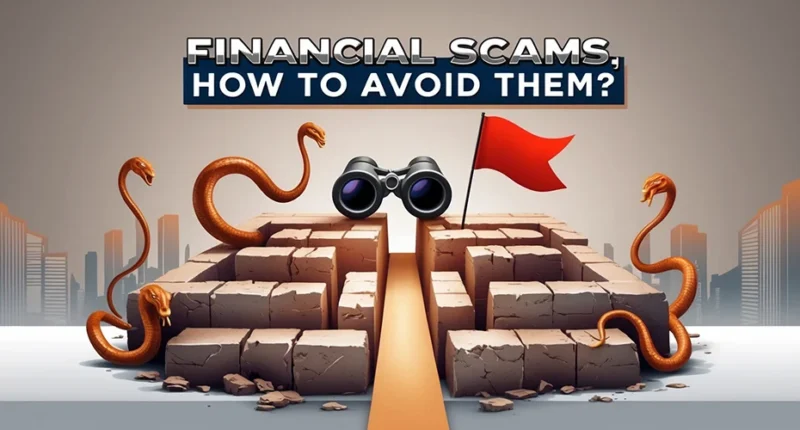Table of Contents
Financial scams are a growing problem, and they can happen to anyone. These scams can range from emails that trick you into giving away personal information, to high-pressure investment opportunities that promise huge returns. The important thing is to stay informed so you can recognize these scams and protect yourself from falling victim. In this article, we’ll look at some common financial scams and give you tips on how to avoid them.
1. Phishing Scams
Phishing is one of the most common types of scams. It usually happens through emails, texts, or phone calls where the scammer pretends to be someone you trust, like your bank, a government agency, or a well-known company. They might ask for personal information like your account numbers, Social Security number, or login details.
How to Avoid It:
- Always double-check the email address or phone number from which the message is coming. Scammers often use addresses that look similar to legitimate ones, but they might have small differences.
- Don’t click on links in emails or text messages. Instead, visit the official website of the company or agency by typing the web address directly into your browser.
- Be cautious of urgent requests for personal information. Legitimate organizations will never ask for sensitive data in this way.
2. Investment Scams
Investment scams often promise high returns with little to no risk. Scammers may offer you the chance to invest in fake stocks, bonds, or even cryptocurrencies. These scams can be very convincing, especially when they use the names of real companies or financial experts to gain your trust.
How to Avoid It:
- Research any investment opportunity thoroughly. Check if the company is registered with financial regulators like the Securities and Exchange Commission (SEC).
- Be skeptical of investments that sound too good to be true. High returns often come with high risks.
- Consult a financial advisor before making any major investment decisions, especially if you are unsure.
3. Lottery and Prize Scams
In this type of scam, you’ll receive a message telling you that you’ve won a lottery, sweepstakes, or prize, but you need to pay a fee or share personal information to claim it. The truth is, if you didn’t enter a lottery or sweepstakes, you haven’t won anything.
How to Avoid It:
- Remember, you can’t win a lottery or contest that you didn’t enter. If you get a message saying you’ve won a prize you never signed up for, it’s probably a scam.
- Never pay money upfront to claim a prize. Legitimate contests don’t require you to pay to receive your winnings.
4. Romance Scams
Romance scams occur when someone forms a fake romantic relationship with you online to manipulate you into sending money. These scammers often build a deep emotional connection with their victims before asking for money, often for an emergency or some other urgent reason.
How to Avoid It:
- Be careful when forming online relationships. If the person quickly starts asking for money, it’s a major red flag.
- Don’t send money to people you’ve never met in person, no matter how convincing their story may seem.
- If someone you’ve met online seems to be moving too fast or is pressuring you for money, consider talking to a trusted friend or family member about the situation.
5. Fake Charities
Fake charity scams exploit your good intentions. They often happen during times of crisis, such as natural disasters or emergencies, when people are more likely to donate money to help others. Scammers may set up fake websites or send you messages pretending to be a legitimate charity.
How to Avoid It:
- Before donating, research the charity. Check their website, read reviews, and verify that they are registered with organizations like Charity Navigator.
- Be cautious of unsolicited messages asking for donations. If you’re unsure, reach out to the charity directly through their official contact details.
- Use trusted platforms, like GiveWell or GoFundMe, to donate to known charities.
6. Debt Relief Scams
Debt relief scams prey on people struggling with credit card debt or loans. They may promise to reduce your debt or make it go away in exchange for an upfront fee. However, these services rarely deliver on their promises and often make the situation worse.
How to Avoid It:
- Be cautious if a company asks for a large upfront fee before doing any work.
- Always check whether the company is accredited by the Better Business Bureau (BBB) or other trusted organizations.
- Look for free or low-cost debt management resources from trusted sources, such as non-profit credit counseling agencies.
7. Fake Job Offers
Scammers may offer fake job opportunities to trick you into providing personal information or paying for training. They often promise high-paying jobs with little effort involved, which should be a major red flag.
How to Avoid It:
- Be skeptical of job offers that seem too good to be true, especially if they don’t require much experience or have an unusually high salary for minimal work.
- Avoid paying upfront for job-related expenses or training unless you’re sure the job is legitimate.
- Do research on the company offering the job. Check their website and search for any reviews or complaints.
Conclusion
Financial scams can happen to anyone, but by staying vigilant and informed, you can protect yourself from falling victim. Always take your time to research before providing personal information or sending money. If something feels off, trust your instincts and consult with a professional. Remember, it’s better to be safe than sorry when it comes to your finances.











